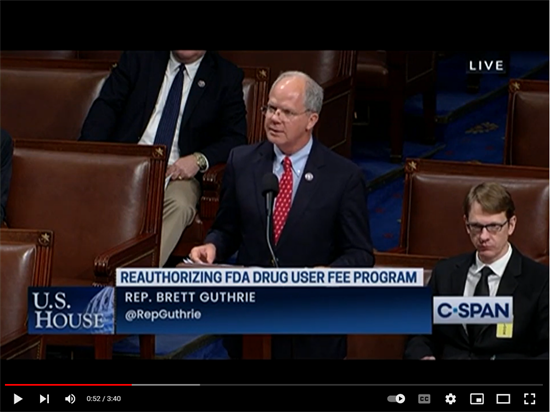Latest News
Guthrie’s Legislative Package to Help FDA Fulfill Mission of Reviewing Drugs and Medical Devices Passes House
Washington,
June 8, 2022
|
S.K. Bowen
(202-225-3501)
Tags:
Health Care
WASHINGTON, D.C. – Congressman Brett Guthrie’s (KY-02) FDA Act of 2022 passed in the U.S. House of Representatives today. This legislative package would reauthorize the Food and Drug Administration (FDA) user fee agreements to help the FDA fulfill its mission of reviewing drug and medical devices. Additionally, the FDA Act of 2022 includes Guthrie’s Pre-approval Information Exchange Act and National Centers of Excellence in Continuous Pharmaceutical Manufacturing Act, and it also includes provisions that would benefit patients by securing medical supply chains, lowering costs, and protecting access to life-saving cures. Guthrie, who serves as the Republican Leader of the Energy and Commerce Health Subcommittee, is co-leading the FDA Act of 2022 with Congresswoman Anna G. Eshoo (CA-18), who is the Chairwoman of this Health Subcommittee. Ahead of the House vote, Guthrie delivered the following remarks on the House floor in support of the FDA Act of 2022.
Click HERE to watch Rep. Guthrie deliver remarks in support of the FDA Act of 2022 As Prepared for Delivery Thank you, Mr. Speaker. I would like to speak in support of the FDA Act of 2022, introduced by Chair Eshoo and myself. This legislation recently passed the full Energy and Commerce Committee unanimously. It will protect access to life-saving cures, promote innovation, secure our medical supply chains, and lower costs for patients. It would also reauthorize the Food and Drug Administration’s medical product user fee programs through 2027. User fees allow the FDA to collect fees from industry in exchange for timely review of their drug or device applications. Importantly, these fees not only permit the FDA to carry out drug or device application reviews, but they also represent significant percentages of the FDA’s total operating budget without requiring significant taxpayer spending. Additionally, according to the Congressional Budget Office, sections of the bill will save close to $600 million by promoting increased access to generic drugs. Some of these savings will be used for deficit reduction and other amounts can be put toward preserving access to critical services in the Medicaid program, such as telehealth. Not only do these agreements help save taxpayer dollars, but they are also yielding significant returns on investment since they were originally authorized by Congress decades ago. For example, in 2021 alone, 38 of 50 of the world’s novel drugs were first approved in the United States. This was made possible by the Food and Drug Administration Amendments of 2017. I am proud to say that the legislation includes two of my bills, the Pre-Approval Information Exchange Act, which will help reduce the time in which patients wait for a drug or a device to be covered by their insurer after it is approved by the FDA. The bill before us today also includes legislation that Chair Pallone and I have been championing for several years to help facilitate the transformation of drug manufacturing processes, so they are more efficient, less costly, and result in improved drug quality. The use of continuous manufacturing technology will not only serve as an incentive for US drug manufacturers to bring their production back to American soil but will also help to reduce drug shortages. Other important components of the FDA Act provide guidance on the collection of real-world evidence for companies with products authorized under Emergency Use Authorization during the Public Health Emergency. This can serve as a strong foundation for the regulatory community in addition to drug or device companies to best understand how products can get approved more quickly and safely in the future. Finally, the FDA Act of 2022 preserves access to life-saving therapies approved under the Accelerated Approval Pathway. By preserving this pathway, we are giving patients hope to one day find cures to currently incurable disease, such as Alzheimer’s Disease or terminal cancers. I urge my colleagues to support this legislation today, and I yield back. ### |

